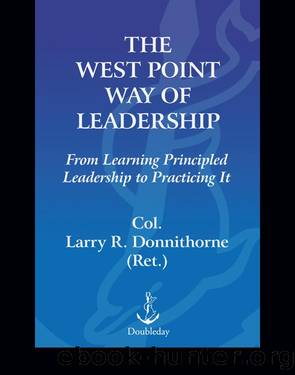The West Point Way of Leadership: From Learning Principled Leadership to Practicing It by Col. Larry R. Donnithorne Ret

Author:Col. Larry R. Donnithorne Ret. [Donnithorne, Larry R.]
Language: eng
Format: epub
ISBN: 978-0-307-56846-5
Publisher: Currency and Doubleday
Published: 1993-07-14T16:00:00+00:00
When MBA candidates study business failures to better understand leadership, it is usually in practical terms, not ethical ones. I think the moral examination of one’s business— war, in cadets’ case—receives an unusual degree of emphasis at West Point. I can’t help wonder if, say, financial institutions whose managers were indicted for insider trading wouldn’t have benefited from a more self-critical education.
If I were to apply the West Point method to teaching ethics to business students, I would begin by teaching an introduction to both logic and the primary themes in moral philosophy to equip the students better for engaging in moral reasoning. Then I would look for historical case studies of actual situations in business which illustrate the spectrum of moral challenges and lapses that can occur. If I were dealing with students who were all from one industry or business firm I would look for those case study situations which arise for employees within that industry. In fact, employees within the industry may be the best source for discovering what those morally troublesome situations are. The more closely we can make the hypothetical situations resemble actual situations with which the students have dealt or will deal, the more fruitful will be the discussion and the more powerful will be their engagement with the moral dilemmas and their ability to make relevant connections to their own work. Following is an example used with cadets. It is a situation taken from the past but one in which any young, future second lieutenant fresh out of West Point could conceivably find himself.
The situation is presented in Just and Unjust Wars and is used to provoke the cadets to think critically in moral terms about a particularly difficult chapter in the Army’s history: the war in Vietnam.
In one chapter Walzer describes the official practice of American units in “free fire zones” answering small-arms fire from Vietnamese villages with artillery and air strikes on the villages themselves—which caused heavy civilian casualties and extensive destruction. Walzer argues that American leaders had a moral obligation to accept greater risks to soldiers, in order to impose fewer risks upon noncombatant Vietnamese civilians.
This notion usually provokes an outcry from cadets in the class discussion. While only one may verbalize this reaction, many others will agree with him. “Come on, sir, don’t you think that Walzer sounds like a pinko liberal worrying about the villagers? War’s hell and if they shoot at me, I’m gonna unload on them with all I’ve got! Nuke ’em till they glow!”
Through my questions I try to elicit the other side: that while the soldier’s job is to take risks, the noncombatant has a right to a reasonable degree of protection. Aren’t there alternative methods for stopping the sniper than strafing the entire village? A door-to-door search is suggested by one cadet —but then rejected out-of-hand by another.
“Why should I risk the lives of my soldiers that way, sir? They could get shot by the sniper the minute they walk through the door!
Download
This site does not store any files on its server. We only index and link to content provided by other sites. Please contact the content providers to delete copyright contents if any and email us, we'll remove relevant links or contents immediately.
What's Done in Darkness by Kayla Perrin(25500)
Shot Through the Heart: DI Grace Fisher 2 by Isabelle Grey(18219)
Shot Through the Heart by Mercy Celeste(18160)
The Fifty Shades Trilogy & Grey by E L James(17774)
The 3rd Cycle of the Betrayed Series Collection: Extremely Controversial Historical Thrillers (Betrayed Series Boxed set) by McCray Carolyn(13189)
The Subtle Art of Not Giving a F*ck by Mark Manson(12912)
Scorched Earth by Nick Kyme(11832)
Stepbrother Stories 2 - 21 Taboo Story Collection (Brother Sister Stepbrother Stepsister Taboo Pseudo Incest Family Virgin Creampie Pregnant Forced Pregnancy Breeding) by Roxi Harding(11040)
Drei Generationen auf dem Jakobsweg by Stein Pia(10217)
Suna by Ziefle Pia(10186)
Scythe by Neal Shusterman(9259)
International Relations from the Global South; Worlds of Difference; First Edition by Arlene B. Tickner & Karen Smith(8608)
Successful Proposal Strategies for Small Businesses: Using Knowledge Management ot Win Govenment, Private Sector, and International Contracts 3rd Edition by Robert Frey(8419)
This is Going to Hurt by Adam Kay(7695)
Dirty Filthy Fix: A Fixed Trilogy Novella by Laurelin Paige(6453)
He Loves Me...KNOT by RC Boldt(5804)
How to Make Love to a Negro Without Getting Tired by Dany LaFerrière(5378)
Interdimensional Brothel by F4U(5304)
Thankful For Her by Alexa Riley(5161)
